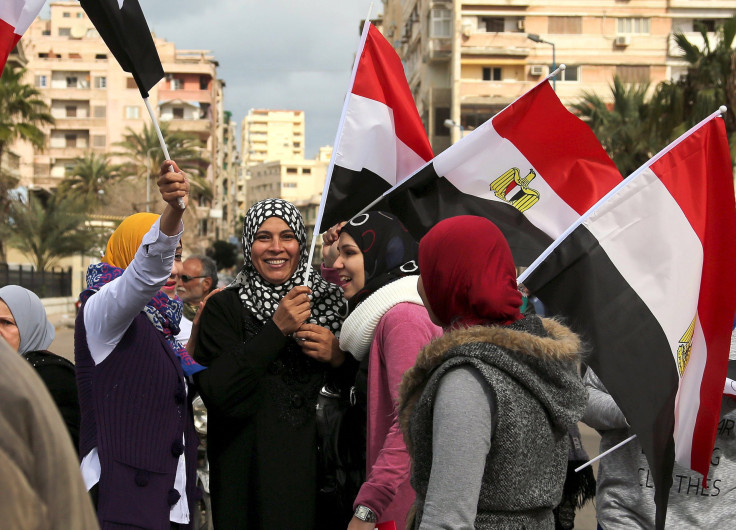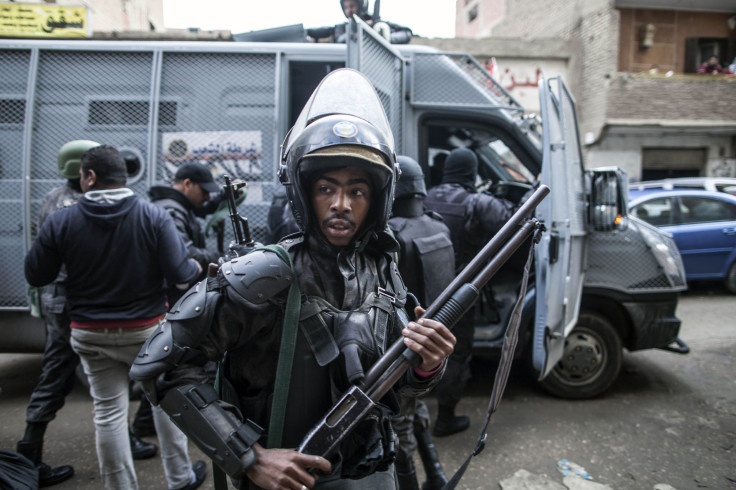Egypt Marks Fifth Anniversary Of Revolution With Crackdown On Protestors, Muslim Brotherhood

BEIRUT— On this day five years ago, thousands of Egyptians — young and old, fit and frail — flooded Cairo’s streets demanding freedom of speech, freedom of political choice and an end to the violent dictatorship of Hosni Mubarak. At the most fundamental level, the people of Egypt sought the freedom to protest against a government that was trying to silence them. Five years on, there’s a new regime and a new head of state but the authorities are still silencing voices of dissent. In the weeks leading up to the anniversary, the Egyptian government, headed by Gen. Abdel Fattah el-Sisi, and the country’s security forces went to great lengths to intimidate demonstrators and urged people to stay off the streets.
A series of small, local demonstrations took place across the country Monday, with the notable absence of any large-scale protests in downtown Cairo or Tahrir Square, the epicenter of the 2011 uprising. This eerie quietness isn’t for lack of reasons to protest: Egypt’s economy is plummeting, the security situation is chaotic and repression from the state has surpassed even the Mubarak regime, analysts say.
“In terms of repression, it is certainly far worse than under Mubarak. There are more arrests and less accountability,” said Amro Ali, a researcher for the University of Sydney based in Alexandria, Egypt. “But at the same time you don’t have a solid state structure. Egypt is not authoritarian, it’s a new form of despotism.”
#Jan25 هنا صنعنا التاريخ pic.twitter.com/Pw46PrREUP
— heba allathy (@h_allathy) January 25, 2016At least one person who opposed the government was killed and several others were arrested Monday at protests organized by the Muslim Brotherhood, Egypt’s armed Islamic political party, but the turnout was paltry compared to Egypt’s “Day of Rage” five years earlier.
“The ingredients for an uprising are always there but the public is exhausted,” Ali said. “The regime is missing the point. People are becoming much more pragmatic, they can see through the smoke screen. Even people who were hard-core Sisi supporters aren’t anymore. They feel betrayed. They feel swindled.”

In 2012, Egypt held its first free elections and Mohammed Morsi, the leader of the Muslim Brotherhood, was declared the presidential winner. A year later, the streets of Tahrir were once again crowded, this time calling for Morsi to step down. Protests culminated in a military coup led by Sisi.
Sisi campaigned on promises to stabilize the country’s security situation, revamp the economy and increase the number of public services for Egyptians. The former general in Mubarak’s army took hold of the legislative reins before the parliamentary elections and passed 175 laws, including strict counterterrorism legislation and a decree canceling daylight saving time in Egypt.
Ahmed Douma, activist and blogger, arrested 2013, sentenced to life imprisonment in #Egypt for protesting. #jan25 pic.twitter.com/JO68uYZvFt
— Jonathan Moremi (@jonamorem) January 25, 2016Sisi’s laws have only entrenched the arbitrary nature of arrest and punishment in Egypt, and the number of terrorist attacks is higher than the country has seen in decades, human rights experts told International Business Times.
“Egyptians have been made to watch as their country reverts back to a police state,” said Said Boumedouha, Amnesty International’s deputy Middle East and North Africa program director. “Tens of thousands have been arrested and the country’s prisons are now overflowing, with widespread reports of torture and hundreds held without charge or trial.”
Since Sisi took power, the Islamic State group’s branch in Egypt’s Sinai peninsula has carried out the deadliest attacks the country has seen since the Mubarak era, most of them targeting military and police forces. The most recent attack took place in Giza on Thursday, when a bomb exploded at an apartment building, killing at least six people, including five police officers, and injuring dozens of others. The group commonly known as ISIS immediately claimed responsibility for the attack.
Sisi’s government claims the recent crackdowns are a necessary tool in Egypt’s fight against terrorism, but others aren’t convinced. In May 2014, Amnesty International reported that more than 41,000 people had been arrested, indicted or sentenced in the year since Sisi took power. The Muslim Brotherhood has been declared a terrorist organization and anyone who supports the group runs the risk of a charge of terrorism and indefinite detention — or a death sentence — in one of Egypt’s notorious prisons. Under Sisi’s rule, last March some 528 Morsi supporters were sentenced to death, while hundreds more remain on trial.
Mohamed Adel, activist, co-founder of April 6th Youth Movement. In #Egypt jail since 2013 for protesting. #jan25 pic.twitter.com/GcbO6Zg4EX
— Jonathan Moremi (@jonamorem) January 25, 2016The irony of these disproportionate punishments, human rights activists say, is that genuine terrorists, including members of ISIS, are evading detection. “Seeing ‘terrorism’ everywhere, but unable to catch it, they have cast a net so wide as to encompass all of Egypt,” wrote Nicholas Piachaud, the Egypt researcher at Amnesty International. “This botched ‘counter-terrorism’ campaign has seen peaceful dissenters locked up while armed groups slip through the net.”
This arbitrary system extends to those hoping to demonstrate on the revolution’s anniversary. Egyptian security forces raided some 5,000 apartments in downtown Cairo in the week preceding the protests. Among those whose houses were searched was the apartment of Amro Ali’s friend Dr. Tarek Mokhtar. Mokhtar is a member of the Freedom Committee in the Alexandria Doctors’ Syndicate and has regularly campaigned for healthcare reforms in the country. The security forces who raided his apartment consider Mokhtar’s advocacy for better healthcare to be against the government. As of Monday, he remains in detention.
“We’re all hoping that this is because of the [anniversary] and it’s just a passing thing,” Ali said. “There is no logic to the way [the security forces] operate. There is no clear path to what they do. This is what you’re dealing with. We’re talking about sheer stupidity.”
© Copyright IBTimes 2024. All rights reserved.





















